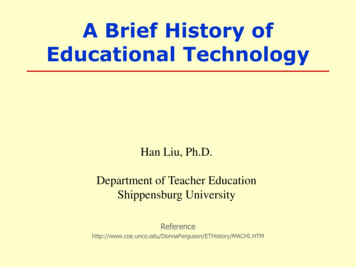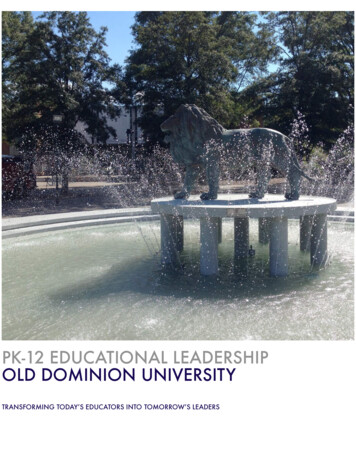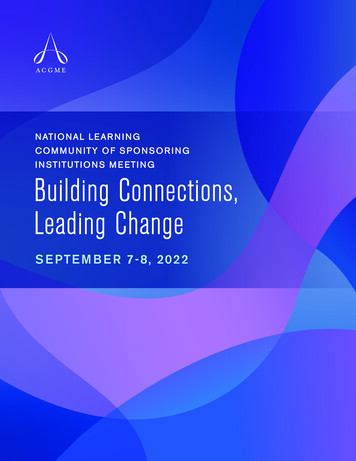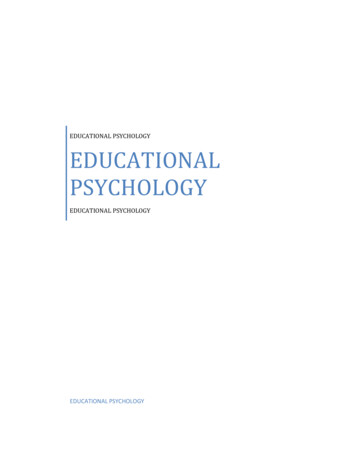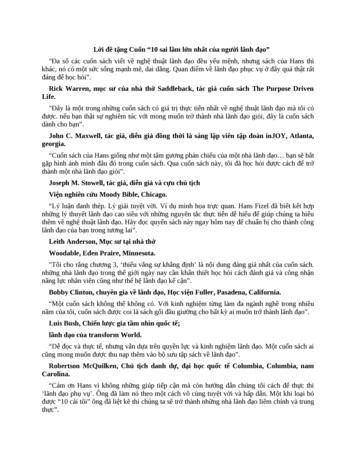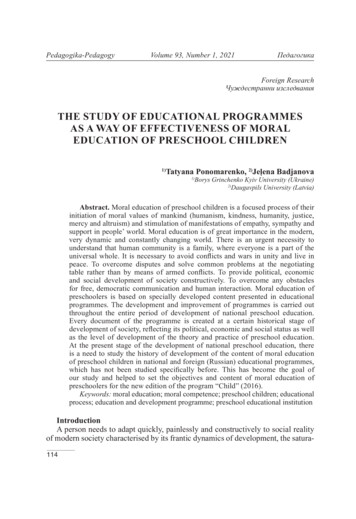
Transcription
Pedagogika-PedagogyVolume 93, Number 1, 2021ПедагогикаForeign ResearchЧуждестранни изследванияTHE STUDY OF EDUCATIONAL PROGRAMMESAS A WAY OF EFFECTIVENESS OF MORALEDUCATION OF PRESCHOOL CHILDREN1)Tatyana Ponomarenko, 2)Jeļena BadjanovaBorys Grinchenko Kyiv University (Ukraine)2)Daugavpils University (Latvia)1)Abstract. Moral education of preschool children is a focused process of theirinitiation of moral values of mankind (humanism, kindness, humanity, justice,mercy and altruism) and stimulation of manifestations of empathy, sympathy andsupport in people’ world. Moral education is of great importance in the modern,very dynamic and constantly changing world. There is an urgent necessity tounderstand that human community is a family, where everyone is a part of theuniversal whole. It is necessary to avoid conflicts and wars in unity and live inpeace. To overcome disputes and solve common problems at the negotiatingtable rather than by means of armed conflicts. To provide political, economicand social development of society constructively. To overcome any obstaclesfor free, democratic communication and human interaction. Moral education ofpreschoolers is based on specially developed content presented in educationalprogrammes. The development and improvement of programmes is carried outthroughout the entire period of development of national preschool education.Every document of the programme is created at a certain historical stage ofdevelopment of society, reflecting its political, economic and social status as wellas the level of development of the theory and practice of preschool education.At the present stage of the development of national preschool education, thereis a need to study the history of development of the content of moral educationof preschool children in national and foreign (Russian) educational programmes,which has not been studied specifically before. This has become the goal ofour study and helped to set the objectives and content of moral education ofpreschoolers for the new edition of the program “Child” (2016).Keywords: moral education; moral competence; preschool children; educationalprocess; education and development programme; preschool educational institutionIntroductionA person needs to adapt quickly, painlessly and constructively to social realityof modern society characterised by its frantic dynamics of development, the satura114
The Study of Educational Programmes as a Way of Effectiveness.tion of information space, constant socio-political and economic changes. This necessitates the moral education of preschool children, the formation of their abilityto understand the social environment, to treat it humanely and to live in harmonywith it.At the same time, in the theory and practice of preschool education, there is acontradiction between the formal, declarative recognition of a person as the highest value of society and the real, not always humane attitude of society to a personand people to each other. Therefore, one of the main tasks of preschool education isthe formation of humanity, humanism and friendly relations of preschool children.To solve this problem, programme support of moral education and developmentof children in the conditions of a preschool educational institution is of fundamental importance. The elaboration and improvement of educational programmes forpreschool children is carried out throughout the whole period of development of thenational preschool education.However, the history of development of the content of moral education of preschool children in national and foreign (Russian) educational programmes with theaim of further improving programmes for moral education of preschool childrenhas not been investigated.The aim of the study: to investigate the history of development of the content ofmoral education of preschool children in national and foreign (Russian) educationalprogrammes with the aim of elaborating tasks and the content of pedagogical workwith children for the new edition of the program “The Child” (2016).The objectives of the study1. To investigate the content of national and foreign (Russian) programmes ofupbringing and development of preschool children in order to explore the essenceof their moral education in its historical development:– programmes implemented in the educational process of preschool educationalinstitutions of the former Soviet Union;– programmes implemented in the educational process of preschool educationalinstitutions from 1991 to the beginning of the second decade of the 21st century, theperiod of formation and establishment of an independent Ukrainian state;– modern national complex and partial programs implemented in the educationalprocess of preschool educational institutions in the second decade of the 21stcentury;– modern foreign (Russian) complex and partial programmes implemented inthe educational process of preschool educational institutions in the first decades ofthe 21st century.2. Based on a study of the history of development of the content of moraleducation of preschoolers of the above programmes to elaborate the content ofmoral education of children for the new version of the program “The Child” (section“The Child in Society”; subsection “Social World”).115
Tatyana Ponomarenko, Jeļena BadjanovaTheory and methodology of the research. Modern national preschool educationis focused on personality development. The goal of preschool education is thedevelopment of each child based on the formation of the basis of his personalculture. The key factors of formation of the child's culture is its interaction withsociety, the acquisition of moral values and knowledge, the formation of moralbehaviour and the development of moral emotions and feelings. (Popova, 2016;Mussapirov et al., 2019; Linde & Petrova, 2019; Lazarova et al., 2015; Jarmusevicaet al., 2019a; Jarmusevica et al, 2019b; Diachok et al., 2020).The moral education of children of preschool age is purposeful interaction between an adult and a child in order to form the moral consciousness of a preschoolchild in the form of concepts, ideas and judgements; the experience of moral actions and moral behaviour; the development of moral emotions, feelings, empathyand sympathy. Formed at the preschool stage the fundamentals of moral competence largely determine further features of a person's life in the world of people.Moral competence is the result of the child's learning and internal acquisition ofmoral laws and rules which are actualized in the process of his moral behaviour anddetermine self-attitude and social reality (Ponimanska et al., 2013)A number of studies have examined the fundametals of theory and practice ofmoral education of preschoolers: the content and organization of communicationof preschoolers as a way of their moral education (Artemova, 1985); theupbringing of moral-volitional qualities of children in a preschool educationalinstitution (Bure, 1986) the formation of moral feelings of senior preschoolers(Vinogradovoy, 1989); the establishment of humane relationships among seniorpreschoolers (Honcharenko, 2003); the formation of awareness of a preschoolchild of moral value of actions (Zolotareva, 1993); the formation of moralbeliefs of senior preschoolers in cooperative activity (Ponimanskaya, 1983); theformation of ethical ideas of junior preschool children (Ponomarenko, 1992); theformation of friendliness of junior preschool children (Ponomarenko, 2016, 2017);the development of humane feelings of preschool children (Pirozhenko et al.,2010); the essence and peculiarities of social development of preschool children(Ponimanska et al., 2013); the essence and features of socialization of children ofpreschool and primary school age (Bohush et al., 2006); the formation of humanerelationships of six-year-old children in dramatization games (Khymych, 1996)and others.The theoretical basis of the study consists of the conclusions of theories andconcepts regarding training at higher education institutions of the Ukraine (Duginets & Petrova, 2020; Dyachenko et al., 2018; Petrova et al., 2019; Petrova et al.,2018; Zagorodnya, 2020).The upbringing of children, in particular moral education, is carried out on thebasis of specially developed content presented in the programmes for the upbringingand development of preschool children.116
The Study of Educational Programmes as a Way of Effectiveness.At the present stage of development of national preschool education, pedagogicalactivity in a preschool educational institution is carried out in accordance with theLaws of Ukraine: “On Education” (2004); “On Preschool Education” (2006), and theBasic Component (standard) of preschool education in Ukraine (2012), programmesfor upbringing and development of preschool children (Ponomarenko, 2008).The programme for upbringing and development of preschool children is a statedocument that defines the goals, objectives and content of work with children,taking into account their age and individual capabilities, on the basis of whichthe educational activities of preschool educational institutions are carried out(Ponimanska, 2004).The basis of a scientifically and methodologically substantiated programme ishistorical pedagogical experience; new achievements of the theory and practice ofpreschool education; relevant public requirements for programme documents in thefield of preschool education; programme compliance with the age characteristics ofpreschool children .In 1989, the Concept of Preschool Education was approved (scientific leadersV. Davydov, V. Petrovsky), which for the first time analysed the negative aspectsof public preschool education in the country, including the moral one. The Conceptnoted that all available education programmes contain a requirement to respect thepersonality of a child, to love children and to carry out moral education. However,the inconsistency between the declaration of success in educating preschoolers,including moral education, and the real state of their upbringing should be eliminated.Particular attention should be paid to the formation of universal values of children,their value-emotional attitude to the social environment, the development of socialorientation and empathy (empathy, sympathy, empathy behaviour), personality traitsthat determine moral relations with children and adults. There was recognized the needfor the development of varied, flexible, dynamic and socially oriented programmesthat would be systematically updated and based on the achievements of world scienceand the practice of preschool education. The need is determined for a gradual,controlled by scientific research, transition from centralized programme support ofthe educational process to the use of flexible programmes based on all the "pluses"and "minuses" of the current standard programme. Thus, the efforts of scientists,educators, practitioners were aimed at the search, elaboration and implementation ofthe content of the programmes of generation (Ponomarenko, 2017).In Ukraine, the first alternative to the “Typical Education and TrainingProgramme” (Ponomarenko, 2017) was the educational programme “The Toddler”for preschool children (Maliatko, 1991). Even then, the ideas of humanization anddeideologization of preschool education were laid down, the value of preschoolchildhood and the priority of educating universal human values were recognized.All this is continued in the project of national Concept of preschool educationdeveloped by the team of authors under the leadership of L. Artemova (1989) in117
Tatyana Ponomarenko, Jeļena Badjanovathe early 90's. Certain changes are also observed in Ukrainian programmes of thosetimes: “The Toddler” (Maliatko, 1991), “The Child” (1993; 2003). However, theydo not get real implementation in practice.In 1999 the Basic Component of preschool education – the standard of preschooleducation in Ukraine was elaborated (1999). The document defines the compulsoryminimum of content of basic educational programmes, the amount of educationalload for children, the requirements for their level of development and upbringingas well as the conditions under which they can be achieved.In 2012, a new edition of the Basic Component of preschool education inUkraine appears (2012), which recognizes the priority of the development of thepersonality of a preschool child and its moral component in particular, as the mainone. The content of the document reflects the modern social ideal of the educationof the child and determines the ultimate goal of preschool education - the formationof the basis of the personal culture of a preschooler through the discovery of theworld in its integrity and diversity. The document contains clear requirements forthe level of preparation of the child for life in the social environment. The contentof the educational line “The Child in Society” provides the formation of moralbehaviour skills of children, the ability to navigate in the world of human relationsand the willingness to empathize with others. Thanks to communication with adults,as carriers of the socio-historical experience of mankind, it is necessary to makethe child feel interested in other people, to form the ability to understand them, toparticipate in cooperative activities with peers and adults, to combine their effortsto achieve a common result, to evaluate their own abilities and to respect the desiresand interests of others.With the advent of the first edition of the Basic Components of pre-schooleducation in Ukraine (1999) goals and content of moral education of complexnational and partial programmes for preschool children we elaborated in accordancewith the requirements of the normative document.The Methodology of research. An empirical study was carried out to verifythe results obtained in the course of a theoretical study. Analysis and synthesis asresearch methods were used as methods of scientific pedagogical research. Analysisand synthesis are processes of the actual or imaginary division of the whole intoparts and the reverse connection of the parts into a single whole. These are twointerdependent processes. The analysis of educational phenomena and processesmeans the mental division of the whole into separate parts. This allows you tosee different sides and characteristics of phenomena and processes, their structure,various stages of their development and contradicting trends. A multifacetedanalysis, which corresponds to the nature of the studied object, allows you to studyit comprehensively. Abstraction and comparisons are also carried out in the processof analytical activity. Synthesis is the process of combining parts into a whole, theopposite of analysis, the realization of a single whole, consisting of many elements.118
The Study of Educational Programmes as a Way of Effectiveness.Dividing the whole into its constituent parts reveals the essence of the object understudy and its structure. Dividing a complex phenomenon into simpler elementsallows us to separate the essential from the non-essential, the complex can bereduced to the simple. Synthesis is already contained in analysis itself, and does notexist outside it (Kozhukhova, 2002).The content of national and foreign (Russian) programmes for the upbringingand development of preschool children was studied as part of the study in order toanalyse the content of moral upbringing of children in its historical development:– programmes implemented in the educational process of preschool educationalinstitutions of the former USSR (“Skills Programme” (1928); Methodical instructionsfor studying the course “Preschool education”, 1984; “Upbringing Programme”,1934); Methodical instructions for studying the course “Preschool education” forstudents I – III, 1984); “Guide for the Kindergarten Teacher” (Methodical instructionsfor studying the course “Preschool education”: for part-time student I – III, 1984;various editions: 1938; 1946; 1953); “Kindergarten Upbringing Programme” (nineeditions with some changes (1962 – 1982) (Methodical instructions for studying thecourse “Preschool education”: for part-time student I – III years, 1984); “TypicalKindergarten Upbringing and Education Programme” (1984);– programmes implemented in the educational process of preschool educationalinstitutions from 1991 until the beginning of the second decade of the 21st century,the period of formation and establishment of the independent Ukrainian state “TheToddler” (Maliatko, 1991); “The Child” (Dytyna, 1993); “The Child in PreschoolYears” (2004);– modern national complex and partial programmes implemented in theeducational process of preschool educational institutions in the second decade ofthe 21st century: The Child, 2016; A confident start: a book tutor, 2017; “I amin the World”, 2019; “The World of Childhood”, 2015; “The Child in PreschoolYears”, 2016; “Ukrainian Preschool”, 2017; “The Sunflower”, 2014; “Ukraine ismy Motherland”, 2016); “Learning to Live Together”, 2016; “The Treasure Chestof Morality”, 2014;– modern foreign (Russian) complex and partial programmes implemented inthe educational process of preschool educational institutions in the first decades ofthe XXI century: “The Rainbow”, 2010; “Kindergarten is a House of Joy”, 2014;“The Origins”, 2014; “The Childhood”, 2019 and the partial programme “I am ahuman” (Kozlova, 2005).Hand by studying the history of the contents of moral education of preschoolchildren in the above programs developed content of moral education of children forthe new edition of the program “Child” (see “The child in the society”, subsection“social world”).The results of the study. The analysis of the programmes implemented inthe educational process of preschool educational institutions of the former USSR119
Tatyana Ponomarenko, Jeļena Badjanovaallows us to state that the image of the “new” person of the future communistsociety, endowed with a combination of qualities, the formation of which must bestarted from an early age, served as a guideline for selecting the content of moraleducation in Soviet preschool education. The formation of cultural and hygienicskills, a culture of behaviour, the discipline, obedience, responsibility, organization,hard work and respect for public property was of great importance in the content ofmoral education, while much less attention was paid to the education of a humaneand friendly attitude to a person.The results of the analysis of the programmes implemented in the educationalprocess of preschool educational institutions from 1991 until the beginning ofthe second decade of the 21st century, the period of formation and establishmentof an independent Ukrainian state, suggest that the ideas of humanization anddeideologization of preschool education are actualised in the objectives, tasksand content of educational programmes. The priority of the development of thepersonality of the preschooler and his moral component in particular as the mainone is recognized. The necessity of ensuring the full-fledged spiritual developmentof a growing personality, its socio-cultural formation and preparation for life in asociety is determined. The priority of universal values is recognized. It is statedthat a person, his life and health, honour, dignity and security are the highest socialvalue. The necessity of forming a child’s understanding of the value significanceof moral norms, laws, rules of socially approved relations between people, theformation of active moral activity is determined.The indicator of the teacher’s effective activity is the child’s conscious moralattitude to life, a sense of security, a comfort feeling among people, trust in people,his high moral activity and the experience of moral actions in the social environment.The feature of the content of the programmes is that their implementation isaimed at expanding the circle of children's ideas about the traditions of the Ukrainianpeople (artistic, labour, language, family, ritual) and at promoting the familiarizationof children with folk wisdom. The tasks and content of the programmes trace theconnection with the traditions of folk pedagogy, folklore and various types of nationaland world art. The necessity of forming a civil culture, a sense of nationality andrespect for the cultures of different peoples of the world is indicated.The results of the analysis of national complex and partial programmesimplemented in the educational process of preschool educational institutions inthe second decade of the 21st century allow us to state that the content of moraleducation in these programs is developed in accordance with the requirementsof the Basic Component of preschool education in Ukraine (2012). This causesa variation of the content of the moral upbringing in the mentioned programmedocuments and no alternative for them.The content of the programmes is focused on the implementation of the maindirection of preschool education - the formation of the basis of the child’s personal120
The Study of Educational Programmes as a Way of Effectiveness.culture through the opening the world in its integrity and diversity to him. Thecontent of the programmes traces the focus on the formation of the minimumsufficient and necessary level for the development of moral competence for achild of preschool age. This implies the presence of developed moral qualities,elementary moral knowledge and vital practical skills that guarantee the adaptationof preschool child to life in the world of people, the ability to navigate in it, torespond adequately to social phenomena, events and people, to exist comfortablyin a public environment.In accordance with the content of the educational line “The Child in a Society”of the Basic Component of preschool education in Ukraine, the content of theprogrammes determines the need: to facilitate the interaction of the child withother people that involves him in human society; the formation of interest in otherpeople, the ability to understand others, to participate in cooperative activities withadults and peers, to combine one’s efforts with them to achieve a common result,to respect their desires and interests, to evaluate personal abilities; the ability toempathize and sympathize with others.The results of the analysis of foreign (Russian) programs implemented in theeducational process of preschool educational institutions in the first decades of the21st century suggest that the tasks and content of moral education of children meetthe requirements of the state standard of preschool education in Russia.So, the tasks of the Russian programme “The Rainbow” (Raduga: programmavospitaniya, obrazovaniya i razvitiya detey ot 2 do 7 let v usloviyah det. sada,2010) included: the formation of preschool children a careful and respectfulattitude to the environment and the world of people, their familiarization withmorality as one of the main areas of human culture. The purpose of the educationalprocess under the programme “Kindergarten is a House of Joy” (2014) isdefined as contributing to the enrichment of the comprehensive, includingmoral, development of the child’s unique personality. The implementation ofthe programme involves the acquisition of a certain system of knowledge aboutthe environment, including social and about the world of human relations.The programme “The Origins” (2014) was developed as a basic developmentprogramme for preschoolers. Its goal is the comprehensive, including moral,development of the child, which meets the age-related capabilities of the childand the requirements of modern society.The programme “The Childhood” (Babaeva et al., 2019) is the programmeof enriched, multi-faceted development and education of preschool childrenin various activities. The child’s development is considered in it as a process ofself-development, overcoming internal contradictions. The implementation of thegoals, objectives, content of the program is aimed at ensuring a single processof socialization of the child. The basis of its technology is the acquisition ofexperience of moral activity in communion with adults and peers in a variety of121
Tatyana Ponomarenko, Jeļena Badjanovachildren's activities. The child's accumulation of valuable experience in cognition,self-knowledge, activity and awareness of his own abilities contributes to thedevelopment of his moral potential.The goal of the programme“I am a Human” attracting a child to the social world(Kozlova, 2005) is to help the teacher to open the world of the social environmentto the child, to form his own image of himself as a representative of the humanity,people, their feelings, actions, rights, obligations and relations. The main contentof the programme is to shape the world-view of the child, a personal vision of theworld and a personal picture of the world including the world of human relations.The results of the analysis of the main Russian complex educational programmesallow us to state the existence of different approaches of the authors to the structureof their content and to focus on the common conceptual approaches: childhood isthe period of child’s physical and mental development; the orientation of adultstowards the development of a child’s personality, his moral upbringing and thepreservation of his personality. The only difference is in the accents that can betraced in the content of the programmes, and in how the child learns it.Thus, the results of the study allow us to state:– moral education is one of the most important directions of the comprehensivedevelopment of preschool children; it determines the formation of his socialcompetence, adaptation skills to a modern, rapidly changing, rather complex socialenvironment;– upbringing and development of preschool children, including their moraldevelopment, is carried out on the basis of specially developed content ofprogramme support for preschool education;– the development and improvement of preschool education programmes iscarried out throughout the entire period of development of national preschooleducation; each programme document is created at a certain historical stage of thedevelopment of society and it reflects its political, economic, social status and thelevel of development of the theory and practice of preschool education;– the goals, objectives and content of moral education of children are determinedon the basis of universal values, values of humanism, kindness and humanity thatdetermines the variability of the content of programme documents as opposed totheir alternative;– the objectives and content of moral education in the study of national andforeign (Russian) programme is designed in accordance with the requirements ofthe Basic Component of preschool education in Ukraine and the state standard ofpreschool education in Russia;– the tasks and content of the moral education of preschool children in theseprogrammes are determined on the basis of recognition of the need to form themoral competence of children together with its cognitive, behavioural, andemotional components.122
The Study of Educational Programmes as a Way of Effectiveness.The study of the section “The Child in a Society” (subsection “Social World”)of the educational programme "The Child" (2016) allowed us to suggest changesnecessary for improving the content of new edition of the program:– from the contents of the section “The Child in a Society” (subsection “SocialWorld”) to delete such components as “Getting to work,” “There are Lots ofDifferent Professions in the World”, “Economic Education”, “The Fire and theChildren”, “Traffic Light that Blinks” and to separate them in other sections of theprogramme “Labour Education” (or “Household Duties”, “Economic Education”,“The Subject World”, taking into account the fact that moral education is aimed atsocializing the child, at forming children’s ability to interact with people in theirprocess of local activities and the formation of positive qualities of a person thatappears in the process of interaction;– to determine the content of moral education on the basis of understanding theneed to form the basic components of moral competence of children (cognitive,behavioural, emotional);– determining the content of moral education, special attention should be paid tothe formation of the behavioural component as the main criterion for the formationof moral competence of preschool children;– to remove such notion as “to teach” children from the text of the programmechanging it to the definitions of “to form”, “to develop”, “to educate”, “to facilitate”,“to motivate”, “to encourage”, which is more rational and acceptable in the educationof preschool children in contrast to the education of primary school children.Based on the study of the objectives and content of moral education of preschoolchildren in the above-mentioned programmes the goals and content of educationalactivity are designed on the moral education of children for the edition of the newversion of programme “The Child” (section “The Child in a Society”, subsection“Social World”).The example of the elaborated tasks and the content of moral education of thesix-year-old children.The tasks of moral education of the six-year-old children: to promote the activeentry of the child into the world of people, the conscious choice of partners forinteraction in various life situations; to form ideas about the moral qualities ofa person as universal values; develop the ability to analyse their actions and theactions of other people in accordance with universal values and moral rules ofinterpersonal interaction; to contribute to the further acquisition of experience inpositive relationships with children and adults and the formation of the abilityto avoid misunderstanding in situations of interaction; to form the ability to actcooperatively in team situations; to encourage the observance of the rules of culturalbehaviour and the culture of interpersonal relations; to form an emoti
field of preschool education; programme compliance with the age characteristics of preschool children . In 1989, the Concept of Preschool Education was approved (scientific leaders V. Davydov, V. Petrovsky), which for the first time analysed the negative aspects of public preschool education in the country, including the moral one. The Concept



